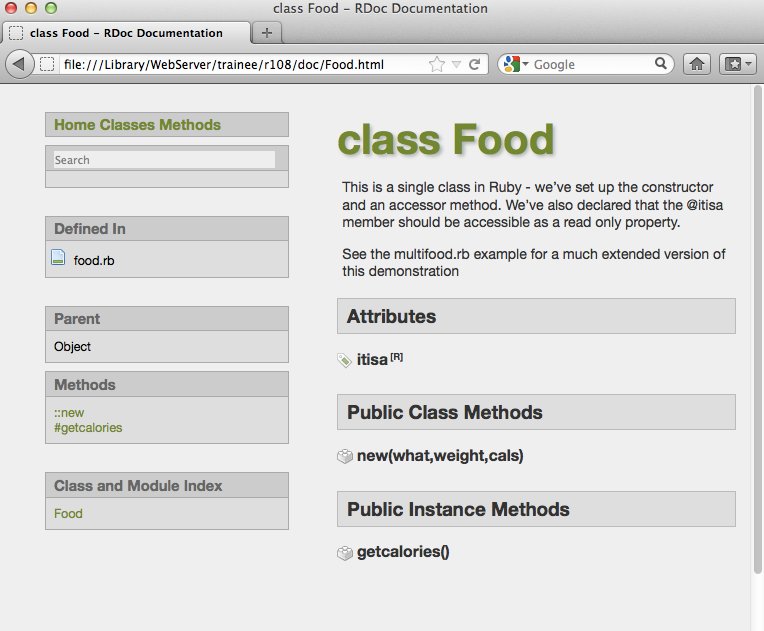
|
Training, Open Source Programming Languages |
| Home | Accessibility | Courses | The Mouth | Resources | Site Map | About Us | Contact |
| For 2023 (and 2024 ...) - we are now fully retired from IT training. We have made many, many friends over 25 years of teaching about Python, Tcl, Perl, PHP, Lua, Java, C and C++ - and MySQL, Linux and Solaris/SunOS too. Our training notes are now very much out of date, but due to upward compatability most of our examples remain operational and even relevant ad you are welcome to make us if them "as seen" and at your own risk. Lisa and I (Graham) now live in what was our training centre in Melksham - happy to meet with former delegates here - but do check ahead before coming round. We are far from inactive - rather, enjoying the times that we are retired but still healthy enough in mind and body to be active! I am also active in many other area and still look after a lot of web sites - you can find an index ((here)) |
|
Ruby Documentation through rdoc
There are three vital elements in any code of significnat size that you write. • There's the code itself • There are programmer's comments which provide an overview of the internals and remarks on how you've done things, why certain decisions were made, known issues for future maintainers, etc • There's user documentation. The "user" may be a person running your complete applicaton, or may be a programmer who uses your classes / module / methods within his encompassing application. Supplied with Ruby, you have rdoc which provides you with a tool to extract and format information from your source files and turn it into documentation. Here's a brief example of rdoc at work. A previous example (food.rb) in which I demostrated a simple class includes a block comment - a section that runs from =begin to =end: =beginThat block comment, in additon to other elements, will be picked up by rdoc and used to generate HTML documentation. Let's see how that generates: munchkin:r108 grahamellis$ rdoc food.rbAnd when viewed, you'll see the following:  Documentation is vital in any software project - on our courses, this is stressed right from the first "Hello World" example - the first working program. We run public Ruby courses (different courses for delegates with different backgrounds) at our training centre and hotel in Melksham, Wiltshire and will run private courses on your site if you've got a group of delegates. (written 2012-07-07, updated 2012-07-14) Associated topics are indexed as below, or enter http://melksh.am/nnnn for individual articles R119 - Ruby Miscellany[1181] Good Programming practise - where to initialise variables - (2007-05-09) [1586] Variable types in Ruby - (2008-03-21) [1720] Some Ruby lesser used functions - (2008-07-26) [1889] Ruby mixins, modules, require and include - (2008-11-16) [1890] MySQL database from Ruby - an example - (2008-11-16) [3155] Rake - a build system using code written in Ruby - (2011-02-03) [3428] How many days to Christmas? - (2011-09-09) [3622] Loading Ruby classes - where does Ruby look? - (2012-02-24) [3783] Load path, load and require in Ruby, and a change from 1.8 to 1.9 - (2012-06-24) R050 - Ruby - General [2104] Ruby Programming and Rails - 4 different courses in one - (2009-03-26) [2227] Learning PHP, Ruby, Lua and Python - upcoming courses - (2009-06-11) [2504] Learning to program in ... - (2009-11-15) [2605] Ruby on Rails - a sample application to teach you how - (2010-01-30) [2826] Ruby - training for automated testing users - (2010-06-25) [2866] Ruby - how does it compare and where is it the right language? - (2010-07-11) [3158] Ruby training - some fresh examples for string handling applications - (2011-02-05) [4294] A bright new gem - updated Ruby training - (2014-09-16) [4583] Back in the saddle again - excellent open source course from Well House Consultants - (2015-11-26) Some other Articles
A Walk on the South BankWhat a difference a year makes A year ago today, a server upgrade and a new Perl example Fancy a weekend away? Try Well House Manor in Melksham, Wiltshire Ruby Documentation through rdoc When you should use Object Orientation even in a short program - Python example zip in Python Backquote, backtic, str and repr in Python - conversion object to string Like a bathroom company with no plumbers Should hotel staff sit on the toilet in the customer bedrooms? |
4759 posts, page by page
Link to page ... 1, 2, 3, 4, 5, 6, 7, 8, 9, 10, 11, 12, 13, 14, 15, 16, 17, 18, 19, 20, 21, 22, 23, 24, 25, 26, 27, 28, 29, 30, 31, 32, 33, 34, 35, 36, 37, 38, 39, 40, 41, 42, 43, 44, 45, 46, 47, 48, 49, 50, 51, 52, 53, 54, 55, 56, 57, 58, 59, 60, 61, 62, 63, 64, 65, 66, 67, 68, 69, 70, 71, 72, 73, 74, 75, 76, 77, 78, 79, 80, 81, 82, 83, 84, 85, 86, 87, 88, 89, 90, 91, 92, 93, 94, 95, 96 at 50 posts per pageThis is a page archived from The Horse's Mouth at http://www.wellho.net/horse/ - the diary and writings of Graham Ellis. Every attempt was made to provide current information at the time the page was written, but things do move forward in our business - new software releases, price changes, new techniques. Please check back via our main site for current courses, prices, versions, etc - any mention of a price in "The Horse's Mouth" cannot be taken as an offer to supply at that price.
Link to Ezine home page (for reading).
Link to Blogging home page (to add comments).
PH: 01144 1225 708225 • EMAIL: info@wellho.net • WEB: http://www.wellho.net • SKYPE: wellho
PAGE: http://www.wellho.net/mouth/3799_Rub ... -rdoc.html • PAGE BUILT: Sun Oct 11 16:07:41 2020 • BUILD SYSTEM: JelliaJamb